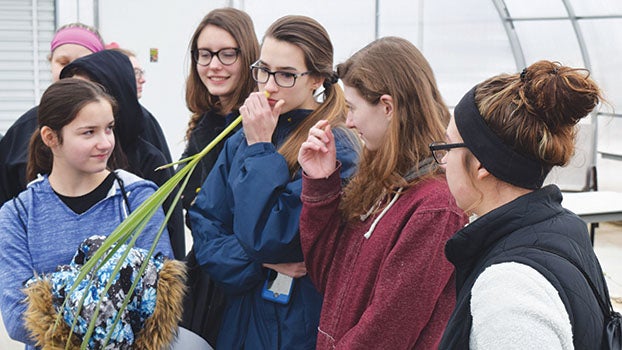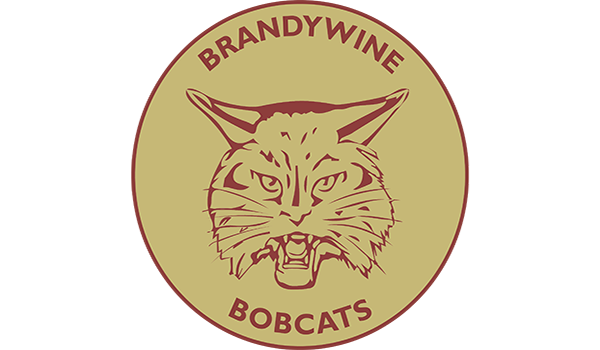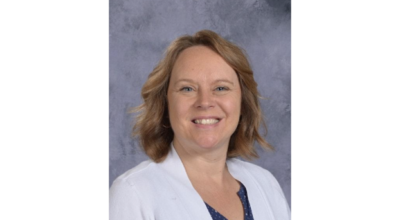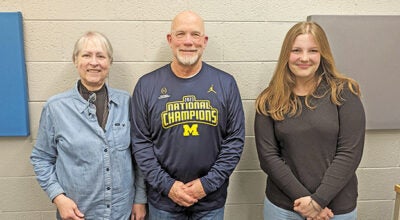SMC hosts 80 high schoolers for Ag Day career exploration
Published 8:31 am Friday, March 1, 2019

- Students sniffed lemon grass, a tropical perennial, and sampled peppery arugula while touring the SMC greenhouse for Ag Day with Stacey Rocklin, MSU Institute of Agricultural Technology program coordinator. Obscured in the raised bed by large broccoli plants are romaine lettuce, carrots, onions and kale. (Submitted photo)
DOWAGIAC — Eighty area high school students learned about Michigan’s diverse commodity mix that yields boundless career possibilities Feb. 26 at Southwestern Michigan College’s annual Agriculture Day. Participants from Bangor, Buchanan, Cassopolis, Benton Harbor Countryside Academy, Dowagiac, Eau Claire, Hartford, Stevensville Lakeshore, Lawrence, Lawton, Marcellus, Mattawan, Niles, Paw Paw and Watervliet visited the Dowagiac campus to meet with faculty and industry representatives about opportunities in the field.
Michigan’s 52,194 farms produce more than 300 commodities — 60 percent crops, 40 percent livestock — on 10 million acres of farmland. Agriculture employs 22 percent of the workforce and accounts for $101.2 billion annually in economic activity, said Deb Barrett, Berrien County senior Extension educator.
Michigan ranks first in dry black and cranberry beans, flowering plants such as begonias, Easter lilies, geraniums, impatiens and petunias, blueberries, tart cherries, pickling cucumbers and Niagara grapes.
A multitude of disciplines lead to ag-related careers: STEM (agronomist, animal behaviorist, animal nutritionist, animal scientist, biochemist, meteorologist, entomologist, geneticist, hydrologist, laboratory technician); health science (veterinarian, veterinary specialist, pharmacologist); transportation, distribution and logistics (aviator, truck driver, train engineer, dock worker); finance (economist, appraiser, loan officer, tax consultant, financial manager); marketing (commodity trader, marketer, wholesaler, retailer); architecture/construction (electrician, plumber, builder, fencing contractor, welder, project manager, estimator); agriculture, food and natural resources (farmer, arborist, botanist, ecologist, florist, food scientist, gardener); manufacturing (chemical supplier, biological engineer, packaging engineer); hospitality/tourism (agri-tourism, chef, hunting guide, park ranger, camp counselor, interpreter/naturalist); information technology (computer specialist, software developer, GIS specialist); arts, audio/visual technology and communications (journalist/reporter, editor, photographer, public relations, advertising, marketing manager); human services (bioterrorism specialist, environmental engineer, nutritionist); law, public safety, corrections and security (lawyer, game warden, inspector); business management and administration (salespeople, associations and councils, consultants, farm owner or manager, purchasing manager, retailer, human resource director); government and public administration (U.S. Department of Agriculture, Michigan Department of Agriculture, legislators); and education (teachers, Extension professionals, professors).
Agronomist Kaite Fraser of Coldwater is horticulturist Stacey Rocklin’s counterpart at “Battle Creek’s” Kellogg Community College. Rocklin joined SMC in 2015; Fraser, who with her husband raises corn and soybeans, joined KCC in 2017 and coordinates its agricultural operations program in partnership with Michigan State University. (Agronomy is the science of soil management and crop production.)
Both SMC and KCC students can earn MSU agricultural certificates while working toward associate degrees.
“Southwest Michigan is the largest area in North America for seed corn production,” Fraser said. “Agronomists are usually problem-solvers for farmers who see a problem in their fields. They don’t know how it got there and they don’t know how to fix it. Being a consultant was the best part of my job because I didn’t have pressure to sell things like Carl (Wagner III) does.”
Fraser demonstrated “crop scouting” fields in Z or X patterns, noting the presence of pests or weeds such as Johnson grass sapping nutrients and water. Colorful digital yield maps guide N-P-K fertilizer recommendations based on soil sampling. N represents nitrogen, P phosphorous, K potassium.
“Blueberries really like acidic soil,” Fraser said.
She encouraged students to calculate on their phones spreading 180 pounds of nitrogen for a yield of 200 bushels of corn knowing the crop removes .9 pound of nitrogen per bushel.
“Educational requirements vary by company,” she said. “Sometimes your SMC ag operations or fruit and vegetable certificate and associate degree are all you need. To be an agronomist for Monsanto or Pioneer with multiple-state territories, you’d definitely need a master’s degree.”
Sessions in Mathews Conference Center East and the Dale A. Lyons Building also featured Natural Resources Conservation Service/Conservation District careers with Victoria Toney; seed sales careers with Wagner, an SMC/MSU alumnus and Niles retail agronomist; and SMC/MSU educational opportunities Rocklin and current students discussed at the Michigan Agriculture Environmental Assurance Program-verified greenhouse.
Toney serves Berrien, Van Buren, Allegan and Kalamazoo county growers with technical assistance for complying with Food Safety Modernization Act produce safety regulations.






